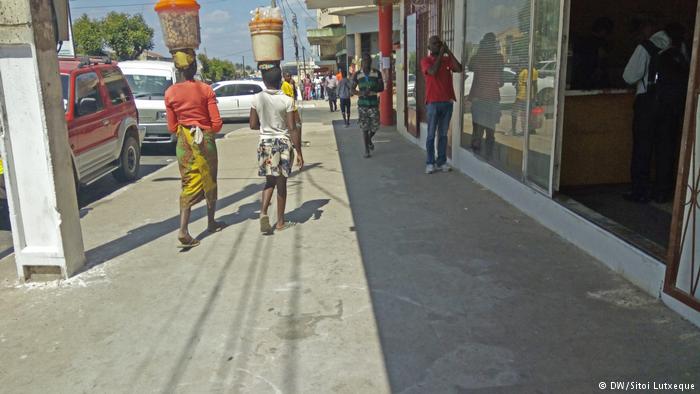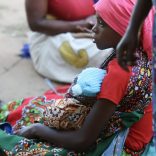Two million Mozambicans are facing food insecurity - government
Children selling on the street accuse municipal police of aggression

DW / Child traders on one of the avenues of Nampula, northern Mozambique
Poverty drives many children in Nampula province into trade to help support their families, but their activity is technically forbidden. Now they are complaining of aggressive behaviour on the part of the municipal police.
Early in the morning, children from various neighbourhoods begin to arrive in Nampula with one purpose: to sell. They sell almost everything – from water, fried vegetables and soft drinks to roasted peanuts and more. Given the poverty that the children face, there survival is at stake.
Sualehe Metarica is 15 years old and has been an informal trader on the streets of Mozambique’s third largest city, Nampula, for years. In the afternoon, as soon as she gets home from her Grade 8 school classes, she is out on the streets selling roasted peanuts.
“I sell to get money to support my studies and eat. I live with my aunt and she also sells,” she explains. The business is not very profitable, but she manages to sell six kilograms a day and make four to six Euros.
The main problem is that local legislation outlaws street trading. When they are caught, the child vendors say they are victims of violence and see their property confiscated without any right of redress.
Says Sualehe: ”We sell here [on the street]. [But] the [municipal police] council rips us off our assets and does not give them back to us. I have no place to sell.”

Twelve-year-old Kelvin also says he often has to run from the police.
“In the mornings I go to school and in the afternoons I sell peanuts. I come here to the city to sell. They never caught me, because I run away and hide. ”
Municipal police deny violence
Nampula Municipal Police declined to comment on allegations of assaulting children. Spokeswoman Mariza Caramacha did however admit that the authorities seized products.
“In the first year, [2014] we confiscated the products, and citizens complained. We warned them that they could not go back to the street, and after two months we started not returning products.
”Non-perishable product we store and sell at auction later. Perishable products we destroy immediately,” she said.
These measures came into force with the new municipal government led by Mahamudo Amurane and aim to avoid congestion and road accidents by putting an end to informal commerce.
Nampula province governor Victor Borges downplays the problem of child labour, saying, “At this moment, we have no record of many cases [of child labour in the province]”.
His emphasis is on prevention.
“What we have said is that we need to avoid factors that can contribute to this. For example, we must train children to be ready to enter the labour market when they are old enough. We are doing that and will continue to do so.”
Children constitute 52 percent of the Mozambican population. Child poverty levels are high, and about 22 percent of children between the ages of 7 and 15 work, according to the United Nations Children’s Fund.













Leave a Reply
Be the First to Comment!
You must be logged in to post a comment.
You must be logged in to post a comment.